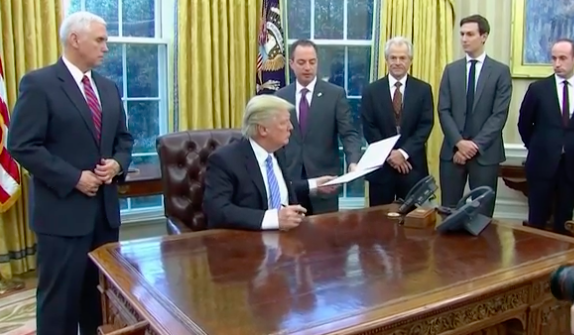 Patrick Henningsen
Patrick Henningsen
21st Century Wire
So the trade wars have begun. Less than 72 hrs into to his first term, President Donald Trump has wasted no time making good on a number of campaign pledges, including today’s signing of an executive order to pull the US out of the Trans-Pacific Partnership (TPP) trade deal.
The 12 nation deal was dubbed the “Gold Standard” by former US Secretary of State Hillary Clinton, and was supposed to be the high-water mark of ex-President Barack Obama’s economic legacy – continuously championed by Obama and his backers on Wall Street, but was not yet approved by Congress.
The deal was initially designed for the US, Canada, Mexico, Japan, Australia, New Zealand, Malaysia, Singapore, Vietnam, Brunei, Chile and Peru, but plans to extend its corporate reach would eventually include all countries in South America and the Pacific Rim. The other 11 nation signatories will likely move ahead with the deal regardless of the US, but it will be a weaker play in terms of geopolitical leverage.
This latest announcement follows Trump’s inauguration speech, promising from now on to put “America First,” while promoting the anti-globalization mantra of , “buy American and hire American.”
Said Trump: “We’ve been talking about this for a long time,” adding that today’s move will be a “great thing for the American worker.”
I will renegotiate NAFTA. If I can’t make a great deal, we’re going to tear it up. We’re going to get this economy running again. #Debate
— Donald J. Trump (@realDonaldTrump) October 20, 2016
Democrat Bernie Sanders responded in kind: “Now is the time to develop a new trade policy that helps working families, not just multi-national corporations.” He added, “If President Trump is serious about a new policy to help American workers then I would be delighted to work with him.”
It doesn’t end there. Expect the new President to also go after George H.W. Bush and Bill Clinton’s signature deal, the North American Free Trade Agreement (NAFTA). This should come as no surprise considering how much Trump savaged the deal on the campaign trail last year, blaming NAFTA for the loss of US jobs and industry since coming into effect in 1994.
NBC News has already reported today that Trump is expected to sign an executive order very soon to “renegotiate” Washington’s free trade agreement between the United States, Canada and Mexico – a pivot which will also include renegotiations on immigration and US border security, as well as the flow of illegal narcotics from Mexico into the US. Trump announced he would be meeting with Canadian Prime Minister Justin Trudeau and Mexican President Enrique Peña Nieto in the coming weeks to discuss terms of a new deal.

Many of Trump’s critics believe that the decades-long process of globalization is an irreversible one, arguing that most manufacturing and low-skill jobs cannot return to the United States – a claim that Trump and his supporters are not willing to concede just yet. Already, Trump’s lobbying efforts have resulted in tens of thousands of manufacturing jobs being relocated back to US shores, including commitments from US firms Carrier United Technologies, Ford Motors, Apple, and Sprint Telecommunications.
At least one Chinese media source has already warned that US companies like Apple did indeed attempt to move thousands of manufacturing jobs back to the US as a “show of patriotism” which would raise costs dramatically.
“It will be almost impossible for [US] to restore its glory as a major manufacturing powerhouse under his presidency,” said Global Times.
Although Obama had cleverly sold the TPP as a way counter China’s growth in the Pacific trade region, the reality is that China already has a solid foothold across the region, and US firms, no matter how hard they might try, will not be able to compete with China’s economies of scale and competitive wage market, not to mention China’s new explosion in skilled engineering and manufacturing tooling the development – all sectors long abandoned by the US in favor of off-shoring skilled industry for profits. The Chinese leadership is slightly more sanguine about the TPP’s fate. President Xi Jinping spoke at Davos last week, saying, “We must remain committed to promoting free trade and investment through opening up and say no to protectionism.” Translated: China’s position is strong and plans to take full advantage of any TPP vacuum created by Trump.
 Not surprisingly, corporate devotee (and Washington’s number one arms industry sales rep) Senator John McCain (image, left) is predicting gloom and doom should the US dump the TPP and other similar deals. According to the 80 year old Senator, “This decision will forfeit the opportunity to promote American exports, reduce trade barriers, open new markets, and protect American invention and innovation.”
Not surprisingly, corporate devotee (and Washington’s number one arms industry sales rep) Senator John McCain (image, left) is predicting gloom and doom should the US dump the TPP and other similar deals. According to the 80 year old Senator, “This decision will forfeit the opportunity to promote American exports, reduce trade barriers, open new markets, and protect American invention and innovation.”
In general, McCain and those with similar allegiances to transnational corporate boards – all claim that US manufacturing exports to Canada and Mexico increased some 248% under the agreement, particularly in sectors like agriculture. But that figure is quite damp when you consider how the U.S. goods trade deficit with Mexico was $58 billion in 2015, along with a $15 billion goods trade deficit with Canada in the same year (Source: US Dept of Trade). Regardless, proponents of NAFTA will rarely if ever mention the flight of manufacturing and industry from the US – a transfer of the real economy which always benefits the bottom line of transnational corporate share holders, but does not help millions of Americans who are still in search of full-time employment.
The other working half of Trump’s plan is of course, lowering US corporate tax rates – making the it more attractive for US firms, and foreign firms too – to locate operations inside the US. That’s the carrot. The stick is punitive Smoot-Hawley-style import tariffs designed to hurt any US firms trying to re-import there foreign-made product back into the US market. How the ying and yang of this proposition plays out depends largely on how many US firms Trump can persuade to come home.
Trump’s moves should be viewed as an opening salvo aimed at the heart of the globalist establishment. In terms of globalist confabs like Bilderberg and Davos, this latest announcement will not be received well at all, as corporatist deals like TPP and TTIP have been at the top of the agenda of their steering committees for decades. American Free Press writer Mark Anderson commented recently on the elitist lament at this year’s Davos Forum:
“Many of the gilded glitterati gathering in Davos, Switzerland amid the towering Alps for the annual World Economic Forum (WEF) see the populism sweeping much of the world as a fascinating trend. They certainly enjoy talking about it. But their academic chitter-chatter is starting to take on a panicked tone over the implications of the common man demanding a better life—a life without poverty in the face of plenty and without nonstop unwinnable wars, among other vexing problems.”
In other word, the globalist agenda has stalled and they’re not taking it well, forced to drink Laurent Perrier, rather than Louis Roederer Cristal. Tough times. The dual failures of the TPP and TTIP (spurred by BREXIT) could be seen as a kick in the teeth for many at Davos, considering that the TPP is regarded by many transnationalists as the ‘life’s work’ of the elite Trilateral Commission and the Council on Foreign Relations. All of these entities have been working tirelessly to advance these deals, and one should not expect to see them disappear without a serious fight, or an attempt to scale the deals down trying to implement them through corporate or administrative and statutory fiat. In this regard, deals like TPP have been viewed as a affront to national sovereignty. If enacted, the TPP would have given sweeping legal powers sought by transnational corporations, with many critics calling it an end-run around the democratic process which places an inordinate amount of power into the hands of corporate lawyers and litigators.
This marks the beginning of a series of major trade face-offs between the new Administration – and everyone else.
How will this translate in terms of dollars and cents for the American economy? We’ll know how the markets react in the short term, but in the long-term, one thing is certain: Trump has radically altered the political-economic environment already. Until preliminary economic data is in, pundits can only speculate and argue. Expect them to, and viciously.
We won’t know much until 2018… just in time for the mid-term elections.
READ MORE TPP NEWS AT: 21st Century Wire TPP Files















